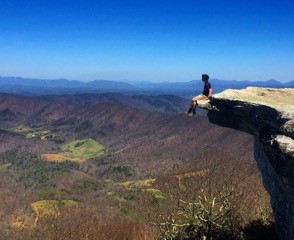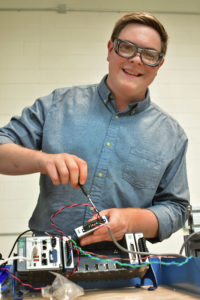March 2020
Michael Thompson
Senior in Materials Science & Engineering
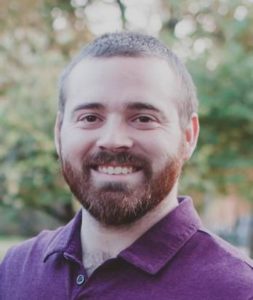
When and where was your research experience? Tell us about your research.
I started my research experience at ORNL in the summer of 2017 analyzing how trace amounts of cerium affected the microstructure and properties of aluminum alloys. The Al-Ce alloy system was still fairly new, and we wanted to see how a new alloy would affect future alloys when introduced into the recycling stream. I was fortunate enough to be able to continue my research through the next few years conducting research on different aspects of the same alloy system using different processing methods (extrusion, AM etc.). My most recent research topic has been high temperature stability of the Al-Ce-Mg alloy after additive manufacturing.
How does the experience benefit you?
This experience has been instrumental in my success in classes and in the laboratory. I started as a community college student, so by the time I got to UT I already had a solid foundation in materials science. I learned the majority of my laboratory practices at the lab, and it made lab classes at UT much easier to get into. I couldn’t ask for a more helpful and supportive group to work with, and often found myself asking them about a topic that came up in class.
Do you have any advice for other students considering undergraduate research?
Don’t wait! Apply as soon as you can. I had no knowledge of the subject matter or even the area of research for my first internship. There are always opportunities out there, but you will never get the chance at them if you don’t apply for them. Even one summer internship will offer more than you may think.
What else are you involved in?
I’m a member of Tau Beta Pi and an interdisciplinary program for transfer students called TranSCEnD. I’m far from a traditional student as they come. I’ve got a wife and two goofball kids I spend all my extra time with outside school and research. I also get to travel with my group a few times a year to conferences and other national labs for experiments.
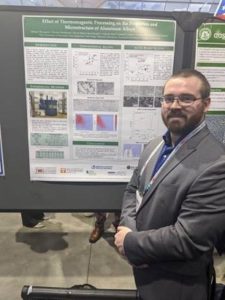
February 2020
Morgan Yount
Senior in Materials Science & Engineering
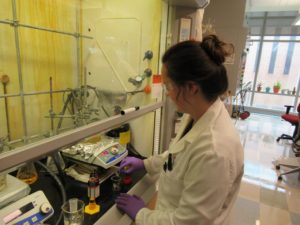
When and where was your research experience? Tell us about your research.
I’ve been lucky to have three different experiences through my undergraduate career. During my sophomore year, I worked at ORNL on modeling corrosion on additively manufactured super alloys. The summer before my senior year, I worked in the Department of Chemistry at Ohio State University on photoluminescence in halide double perovskites. During my senior year, I’m working in Dr. Rawn’s lab at JIAM in Knoxville. I’m primarily the lab manager, taking care of and helping others with the equipment for the Center for Materials Processing, but I’m also starting work on the steric entrapment of Sr12Al14O33, a transparent conductive oxide.
How did the experience benefit you?
Early on as a student, research was useful in helping me connect the dots between my academic courses, lab courses, and past knowledge. Lately, it’s been super useful in showing me what I can do with my degree, but also helping me understand how the research and academic community work. Because of that, I learned I actually am prepared to graduate and go to grad school in the fall!
Do you have any advice for other students considering undergraduate research?
There is not a single other thing that will be so tremendously helpful as doing research as an undergraduate. You can talk about all the quantifiable benefits, like resume fodder, but there’s also the intangibles like building your network, your skills, your confidence, and helping you identify what you do and don’t like in terms of topics and research areas. Even if you just have one research experience, that’s fantastic, so don’t be afraid to get your toes wet.
What else are you involved in?
I’m a member of Tau Beta Pi TN-A and Materials Advantage. I’m also an MSE Ambassador, helping to build programming for our current students and giving tours and recruiting future students. Outside of school activities, I volunteer at a local animal shelter which is where I adopted my dog a little over a year ago. We enjoy weekend hikes and staying active; she’s even gotten me running again (gasp!), but there’s always benefits to a good cuddle.
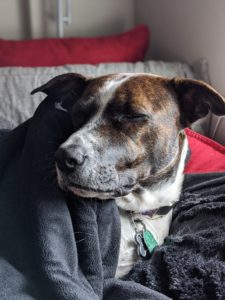
November 2019
Serena Beauchamp
Senior in Materials Science & Engineering
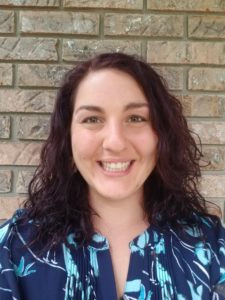
When and where was your research experience?
I began my research assistant position in January of 2019 under Dr. Suresh Babu. Over the summer, I mainly worked at the Manufacturing Demonstration Facility (MDF) here in Knoxville, TN and was given the opportunity to go to Ohio and Pennsylvania for testing and to meet with industry partners.
Tell us about your research.
I assisted in the tensile testing and fractography of additive manufactured (AM) 316L tensile bars which were used to put together a data package for an ASTM standard of AM parts. The tensile bars were designed with varying sizes and density of pores, then half of the bars were subjected to hot isostatic pressing (HIP). The tensile tests were recorded to later be analyzed using Digital Imaging Correlation (DIC). We focused on the re-opening of pores at room temperature and how the size of the defects affected the tensile strength, yield strength and elongation in both the HIP and as-printed parts. Currently, I am assisting another grad student with the rapid characterization of AM aluminum alloys for car parts.
How did the experience benefit you?
This experience has provided me with hands-on experience and application of topics learned in class in addition to a better understanding of the metallurgy behind AM. I now have hours and hours of experience on multiple SEM’s and light microscopes as well as a great foundation for work in a metallography lab. It has greatly opened up my networking circle and given me the opportunity to investigate the research and development side of engineering.
Do you have any advice for other students considering undergraduate research?
This position has provided me invaluable knowledge and insight to graduate school and the diverse projects that graduate students work on. It has introduced me to the scientific community where questions and ideas are highly encouraged. This is the time to explore and figure out what one really wants out of a career and I would highly recommend venturing into undergraduate research to help figure that out and gain some skills along the way.
What else are you involved in?
I am a member of Tau Beta Pi and a participant in the first cohort of the TranSCEnD program for transfer students. When I am not at school or doing undergraduate research, you can find me at one of my other jobs: Aubrey’s or gardening/housecleaning. Outside of work and school, I enjoy playing co-ed flag football, hiking with my two dogs, tending to my own gardening and baking delicious goodies for friends and family.
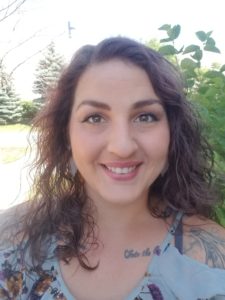
October 2019
Logan White
Junior in Materials Science & Engineering
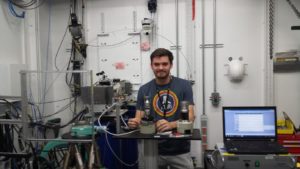
When and where was your research experience?
I began my current undergraduate research position during the spring of my first year. The majority of my work is done on campus, but I have gotten to travel to Argonne National Lab in Chicago to conduct experiments.
Tell us about your research.
My work is based upon investigations of 3-D printed metal characteristics using high energy synchrotron x-rays. We gather tomography, diffraction, and radiography data at national labs, such as Argonne National Lab or Oak Ridge National Lab. I am then tasked to manipulate the raw data into meaningful representations such as tomographic images, texture maps, or data plots, and explain any trends or physical phenomena using my background in MSE.
How did the experience benefit you?
In my experience, I was given a wide range of freedom with how I completed tasks as long as I could defend the validity of my methods. This freedom helped me develop my problem-solving skills and scientific creativity that is necessary as a researcher. I also have more tangible skills such as how to write research papers and proposals for National Labs, give talks at conferences, and professional lab etiquette.
Do you have any advice for other students considering undergraduate research?
For our department, it is not difficult to get involved in research. Almost every professor knows someone who has an open position or will have one in the future. Internships can be more competitive, but if you are involved in the materials science community then opportunities will open themselves up to you.
What else are you involved in?
I am involved in Materials Research Society and the local ASM international chapter, both which promote undergraduate research. I also participate in intramurals with my classmates whenever we want to get together and have some fun outside of class.
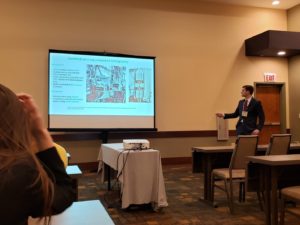
September 2019
Melanie Buziak
Senior in Materials Science & Engineering
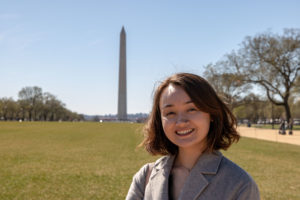
When and where was your internship experience?
This summer, I interned for Congressman Steve Cohen (D-TN-09) in his Washington, D.C. office from July to August.
Tell us about your internship.
Working as a Congressional Intern, I gave tours of the US Capitol building, attended briefings and hearings for the House Committee on Science, Space, & Technology, and responded to constituent mail regarding a range of policy and issue areas. I even attended a briefing on the act of Shark finning, it’s threat towards sharks as an apex predator of our ocean, and therefore how it will affect our most major oxygen source.
How did the experience benefit you?
My internship in Congress afforded me an incredible opportunity to gain first-hand experience within our legislative body. I learned about all of the legislation being passed from the House to the Senate, from horse soaring to foreign election interference to initiatives that will increase diversity in STEM. Additionally, working for the Congressman of my hometown gave me a unique perspective on the wants and needs of my community, and made me so appreciative of where I call home.
Do you have any advice for other students considering an internship or co-op?
I would highly encourage all engineering students to not be afraid to branch out and explore interest areas outside of engineering. I think you can not underplay the skills you gain from non-engineering opportunities that may still be utilized within engineering. Not to mention, we only have so many summers in college, and this is a wonderful time to soak up knowledge from every area available to us as students.
What else are you involved in?
During the academic year, I am an intern at Oak Ridge National Laboratory studying biofiber-enabled materials. I am also Chair of Material Advantage, an academic society that connects Materials Sciences undergraduates to Materials Science professionals. Through Material Advantage I have traveled to multiple Materials Science conferences, as well as an annual trip to Washington D.C. during appropriations season to advocate for STEM funding by meeting with Tennessee Congressmen and Senators.
Additionally, for International Intern Day, the Congressman tweeted about us. Here is the link: https://twitter.com/RepCohen/status/1154502935105167360. It can also be found on his Instagram, @repcohen.
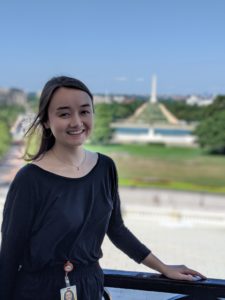
April 2019
Cullen Pearson
Senior in Materials Science & Engineering
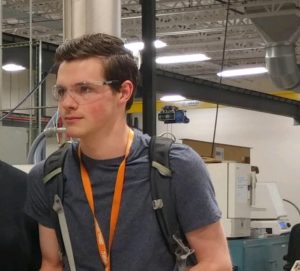
When and where was your internship experience?
I’m currently interning at Eastman Chemical for the spring 2019 term.
Tell us about your internship.
I am an intern in the Materials Team at Eastman Chemical. My job mainly entails failure analysis and materials selection. This lets me spend time doing hands-on lab work, devising experiments, and presenting my findings. Given the size of Eastman, there are many problems that require the expertise of materials engineers, so the workload is extremely fast paced and diverse.
How did the experience benefit you?
Going from research and academia to industry has been a fulfilling experience. The volume and pacing of work has enabled my own growth as an engineer. The diversity of work lets me apply the skills and knowledge I’ve gained at UT MSE differently than in research, in that I am rarely looking to perfect a theory but rather find the most ideal engineering solution.
Do you have any advice for other students considering an internship or co-op?
It goes without saying that internships and co-ops offer invaluable experience and acumen to anyone’s undergraduate career. I highly recommend spending time in industry, even if your interests are strictly in research, because internships and co-ops have the potential to inform your decisions about your post-undergrad path.
What else are you involved in?
I work under Dr. Suresh Babu studying the Flash Processing of steels. My time in Suresh’s group has been a formative experience, giving me the skills and resume that made me a competitive candidate for internships. I am also president and founder of the Blacksmithing Club, which recently won the “most beautiful blade” award at the TMS 2019 Bladesmithing Competition. Check out the blade in the lobby of Ferris Hall!
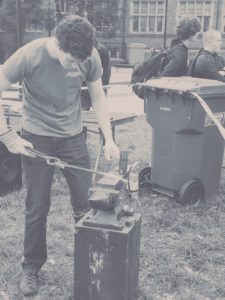
March 2019
Sabrina Schwerzler
Senior in Materials Science & Engineering
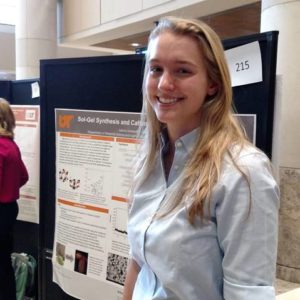
When and where was your research experience?
I have been doing research with Dr. Rawn’s group at UT since the summer after my first year. For the first two years, I worked under a graduate student, but I am now a laboratory manager and have several independent research projects. I also spent one semester working as an intern at ORNL in the High Temperature Materials Laboratory.
Tell us about your research.
The foundation of my research is ceramic synthesis and characterization. The primary material I work with is an inorganic electride called mayenite that has potential to be a thermoelectric. I have also worked to understand the crystal structure of contaminated molten salts used in renewable energy applications. Over the course of my research, I have learned several different types of synthesis and have become very familiar with x-ray diffraction.

How did the experience benefit you?
Undergraduate research has taught me how to use dozens of different pieces of laboratory equipment and how to design effective experiments. It has allowed me to apply the concepts I’ve learned in class with hands on experience. Research has been the most educational and constructive experience I’ve had at UT.
Do you have any advice for other students considering undergraduate research?
Undergraduate research is the best way to learn in MSE. Nothing compares to hands on time in the lab. Don’t worry about being unprepared for undergraduate research, mentors will give you all of the tools you need to succeed on a new project.
What else are you involved in?
I am a member of the UTK Blacksmithing Club. In my free time, I like to solve twisty puzzles like the Rubik’s cube and the megaminx.
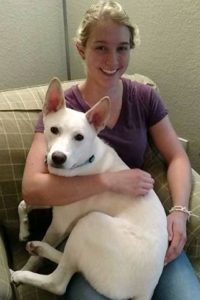
February 2019
Robert Jackson Spurling
Sophomore in Materials Science & Engineering
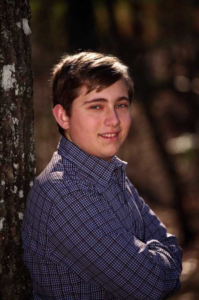
When and where was your undergraduate research experience?
I conducted research from June-August 2018 as a student intern at Oak Ridge National Laboratory under the mentorship of Dr. Kinga Unocic in the Microscopy Group.
Tell us about your research.
During my summer appointment, I participated in a project in which we characterized creep-tested nickel-based superalloys designed for use in advanced ultra-supercritical power generation. This work involved using scanning electron microscopy (including energy dispersive spectroscopy) to characterize phase changes and fracture behavior within the superalloy samples. Development of certain phases in the microstructure may lead to material failure, so understanding when and how such phases grow is important.
Advanced ultra-supercritical power generation requires temperature and pressure conditions up to 750°C and 35 MPa, respectively. The tested alloys — intended to exhibit microstructural stability at high temperature and pressure conditions required in construction of coal-fired boilers for more efficient operation — represent the cutting edge in modern metallurgy, and so characterizing them provides critical information to materials scientists who continue to develop better alloys for such applications.
How did the experience benefit you?
Certainly, being in this lab environment helped me gain experience with the equipment that materials scientists use for research on a daily basis, and it also helped me apply the knowledge I gained from taking classes at the University of Tennessee. However, even more importantly, this project solidified my passion for materials research and has continued to inspire me to pursue a career in this area. In particular, I am interested in conducting research related to materials solutions to energy problems.
Do you have any advice for other students considering undergraduate research?
It is never too early to start undergraduate research; in fact, it’s often what really gets you “hooked” on materials science or any STEM field. Research has been a great compliment to my coursework, because it helps me to see the practical application of what I’m learning in the classroom. The most important attribute for any researcher is an intellectual curiosity; being passionate about what you’re doing is more important than any previous experience or knowledge you have. I would strongly encourage any student who is eager to learn and is interested in using a hands-on approach to solve scientific problems to pursue undergraduate research opportunities.
What else are you involved in?
I am currently the Secretary of the Microscopy Society of America Student Council (MSA StC). In this role, I help promote interest in microscopy-related career paths for students through outreach programs. We are currently working on solidifying our social media presence and using events such as webinars as well as our annual conference to encourage students to consider a career in microscopy research. Previously, I served as a Regional Liaison for the MSA StC for the Southeastern United States during 2017-2018. In this capacity I helped promote activities of the Student Council in the states of Tennessee, Virginia, Kentucky, North Carolina, and South Carolina.
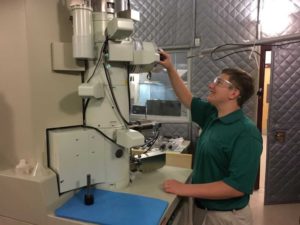
November 2018
Breanna Ellis
Senior in Materials Science & Engineering
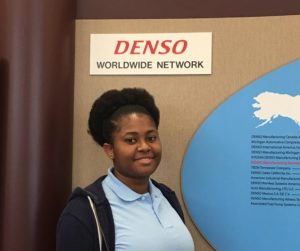
When and where was your undergraduate co-op experience?
I had the opportunity of working with some great engineers at Denso Manufacturing, Inc. in Maryville, TN. My co-op experience lasted from May 2017 to August 2018.
Tell us about your co-op.
Denso is an automotive parts manufacturer and one of the top suppliers to major automakers. During my co-op, I worked in the Starter/Alternator Division in Parts Production Engineering group. My department worked with the cutting lines which machined starter housings and alternator frames. For one project, I developed an automated database for Quality Control (QC) to use during their daily inspections of the induction hardening process on drive shafts. This allowed for an hour to be shaven off a 4-hour process. I also headed the automation removal from a process on one of the frame lines that resulted in a 25% machine operating ratio (MOR) increase. These are just a couple of the many projects I worked with.
How did the experience benefit you?
I was able to develop my professional skills all the way to software skills. Being able to work alongside engineers and being treated like a full-time engineer allowed me to really see what I had in store upon graduation. I was also able to see that what I’m learning class is going to aid me in the real world. But I believe my greatest benefit from this whole experience was discovering that I love working in manufacturing.
Do you have any advice for other students considering a co-op or internship?
I think if you are interested in a co-op or internship, then you should go for it. There are so many opportunities out there for us. What made me pursue a co-op was my desire to do hands on work. The best advice I can give is to make sure that you get some type of experience before graduating whether it be through research, internship, or co-op. This is very important because these experiences allow you to figure out what you like and don’t like early on opposed to trying to figure it out after graduation.
What else are you involved in?
I am an Ambassador for the Office of Engineering Professional Practice. We’re located in 110 Perkins Hall. Our job is to help engineering students obtain co-op and internship experiences. We do this through our engineering expo in both the fall and spring, mock interviews, resume critiques, and our advisors can help get you connected with various companies. You should come by to see us. I am also involved with the National Society of Black Engineers (NSBE) which is an organization that strives to increase the number of culturally responsible black engineers who excel academically, succeed professionally, and positively impact the community. I actually served as Vice President during my co-op and as other positions on the board for 3 years prior to that. But while I’m not on campus, my most exciting hobby is playing around and caring for my 6 month old puppy!
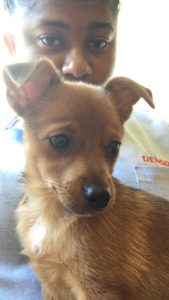
October 2018
Collin “Cotton” Pekol
Junior in Materials Science & Engineering
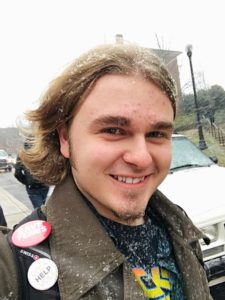
When and where was your undergraduate research experience?
In the summer of 2018, I worked with the asphalt binder group at Paragon Technical Services in Richland, Mississippi.
Tell us about your research.
I studied various asphalt binders and how their rheological properties varied due to differences in processing and the introduction of polymer additives. These properties were determined by methods such as dynamic shear rheometry, bending beam rheometry, rotational viscosity testing, and direct tension testing. One particularly interesting project I took part in was a study of tribology. In the study, neat (or unmodified) and modified binders were evaluated as lubricants by rotational testing in a dynamic shear rheometer.
How did the experience benefit you?
As a part of Paragon’s binder group, I worked with researchers and technicians with years of experience in the field. They were invaluable mentors and I learned much from them in terms of science and industry. Most research conducted was highly specific to asphalt, but I also learned much about polymer science and laboratory practices. Additionally, I have since become familiar with many new types of testing and instrumentation not typically seen or discussed in the classroom.
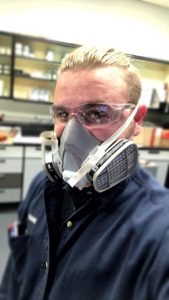
Do you have any advice for other students considering undergraduate research?
Every good relationship you establish with professors, upperclassmen, and even your peers can open incredible doors of opportunity for you. For myself as well as many of my peers, undergraduate research is an unparalleled opportunity to learn outside the classroom and see what “real life” materials science and engineering is all about. Not only has research increased my understanding of MSE as a whole, but I have also met incredible people and made many friends in my work.
What else are you involved in?
On campus, I am an undergraduate teaching assistant for Honors Engineering Fundamentals. I remember being very impressed that first year with the professors and their dedicated team of TA’s. Now, two years later, I have an opportunity to “give back” to that class and those same professors. I am still relatively new in the position, but I already recognize it as a valuable experience with yet another dedicated team. If you want to chat about research, asphalt, or being a TA, I’m always around Ferris!
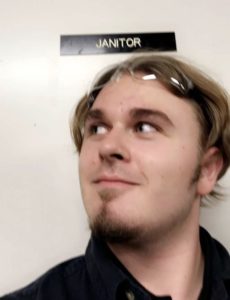
September 2018
Daniel Rutstrom
Senior in Materials Science & Engineering
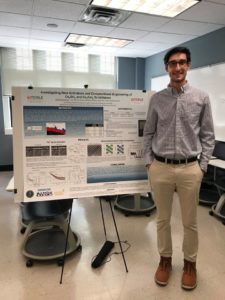
When and where was your undergraduate research experience?
I began my undergraduate research in the Fall semester of 2016, which was during my second year at UT. I joined the Scintillation Materials Research Center (SMRC), and I am currently still doing undergraduate research in this group.
Tell us about your research.
The research that I do is on discovery, synthesis, and development of novel metal halide scintillator materials for radiation detection applications, such as nuclear security. The specific work that I do primarily involves single-crystal growth and a variety of characterization techniques ranging from structural analysis, such as X-ray diffraction, to spectroscopic and luminescence properties. I am also fortunate to have the opportunity to travel out to ORNL occasionally to perform single-crystal XRD measurements.
How did you go about finding this research opportunity?
I knew during my first semester at UT that I wanted to eventually do undergraduate research. So the first thing I did was look through the MSE faculty directory to find out what type of research all the professors in our department were doing, and I was able to narrow it down to a handful that were interesting to me. The following semester I was taking MSE 201, and the professor teaching the class was Dr. Zhuravleva, who is a faculty member at the SMRC. I mentioned that I was interested in doing undergraduate research and wanted to learn more about scintillator materials. There turned out to be an open position for an undergraduate assistant, and I applied and got the job. So the bottom line is that it’s really just as simple as asking.
How did the experience benefit you?
I think the hands-on lab experience and improved communication skills have been the most beneficial aspects. Whether I continue with a career in academia or end up in an industry job, I have an idea of what to expect and feel more prepared after having worked in a lab environment for a couple of years. I did an internship the summer before I started research, which was comparable in terms of lab experience and expectations, but I personally feel like I’ve benefited more from my time as an undergraduate researcher. Another valuable aspect of this experience is that I’ve had the opportunity to attend and present at multiple scientific conferences. Seeing different perspectives from other researchers in my field has really helped me to better understand my own research. Conferences have also been great opportunities to network with researchers from national labs and other universities.
Do you have any advice for other students considering undergraduate research?
Find out what topics might interest you and look for those opportunities first, but be willing to accept other research opportunities if your first choice isn’t available. You can always switch to another group after a semester or two if you want to experience a different research area. Getting to know some of the MSE faculty, or even upperclassmen, can be helpful as well when looking for opportunities. Networking in general is something I would highly advise. My last piece of advice is don’t be intimidated about not knowing everything before starting research. You’ll learn along the way.
What else are you involved in?
In addition to research I am occasionally involved with the Materials Research Society (MRS), albeit somewhat intermittently. Outside of academics I mostly spend my time running. Over the past year I’ve gotten really into training for half marathon races.
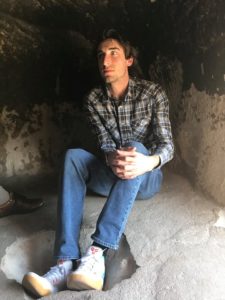
April 2018
Madeline Wimmer
Senior in Materials Science & Engineering
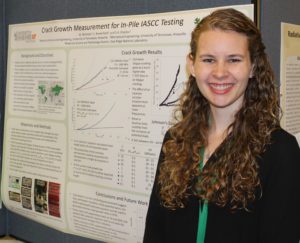
When and where were your undergraduate research experiences?
My first and sophomore year, I worked with a group on campus studying fuel cells. After this, I interned at a local company that makes airbag inflators for cars before I ended up leaving for a summer research opportunity studying corrosion in the Materials Science and Technology Division of Oak Ridge National Laboratory (ORNL).
Tell us about your research.
Obviously, all three experiences were incredibly different and showed me different sides of what MSE is and does. With the fuel cells group, I would mix platinum solutions to apply to the cell as a catalyst for the reaction. At ARC Automotive, I helped examine welds and developed test plans to change the materials used in the airbag inflator for various reasons. When I was at ORNL my project was studying corrosion cracking in radiation where I worked to develop a way the crack growth could be studied while exposed to radiation in ORNL High Flux Isotope Reactor (HFIR).
How did you go about finding these research opportunities?
My first opportunity came from talking to my SWEetie (an upper-classman engineering mentor through the Society of Women Engineers) about her work with the same group. They had an open position, I applied, and started November of my first semester at college. The second two came from talking with professors in the MSE department who have connections and were willing to recommend me.
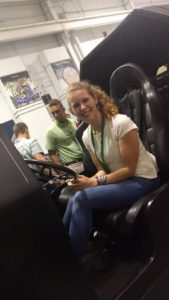
How did the experiences benefit you?
Aside from the skills gained and getting paid, I was able to figure out what I liked. While at ORNL, I was able to tour most every major program and facility they have and met so many amazing people doing things I didn’t know existed. While working on campus, I was able to make connections between classes and research with gave more meaning to what I was learning in lectures.
Do you have any advice for other students considering undergraduate research?
If you have the opportunity, go for it. It is never too early to get involved and even if you realize you don’t like the work you are doing, you know that and can figure out what it is you do like. Plus, most groups work with your schedule, let you take time off to study for exams, AND pay you, so there really is nothing to lose.
What else are you involved in?
I spend most of my time not in class at the Wesley Foundation, the Methodist student center on campus. I also serve at the lead MSE Ambassador – if you want to come learn more about the department, we can talk to you via email, phone, or take you out to lunch if you are local (mse4me@utk.edu) – and Materials Advantage Outreach Chair. I do also like to hang out with friends (and do things like go to the zoo), watch a movie, take exercise classes at the TRECS, and lay in a hammock whenever I have the chance though!
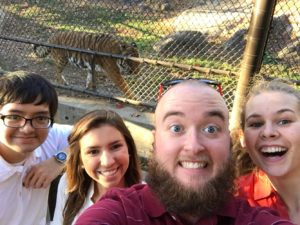
March 2018
Max Neveau
Junior in Materials Science & Engineering
When and where was your undergraduate research experience?
I have worked at the Oak Ridge National Labs (ORNL) Manufacturing and Demonstration Facility (MDF) since the summer of my first year.
Tell us about your research.

Working in combination with ORNL and the Critical Materials Institute (CMI), I have helped develop and implement a Direct Metal Write 3D printer. The system uses an Aluminum Cerium alloy developed by the Critical Materials Institute. The alloy has had great success being used in many processes, including casting, other additive manufacturing processes, and my own! Many metal additive technologies require large and expensive systems to control the material and environment. The proposed system is more cost-effective.
How did you go about finding this research opportunity?
A lot of talking to professors and people I have met who work at ORNL. I had to go through three or four possible options before I was able to land the internship. It has been very rewarding, so if you hear about an opportunity, PURSUE IT!
How did the experience benefit you?
One of the most important benefits I have gotten from my research experiences has been seeing the day-to-day activities of a lab. It has pushed me to pursue a graduate degree.
Do you have any advice for other students considering undergraduate research?
DO IT! I am sure you have heard it before, but I might as well say it again. Industries, academia, and lab research take a very hard look at what you do beyond your classes. Being a part of a research group gives you not only something to talk about in interviews, but is some invaluable experience that will help prepare you for whatever you may do after college.
What else are you involved in?
I am currently the treasurer of the UTK’s Co-ed Professional Engineering Fraternity, THETA TAU (https://www.tennesseethetatau.org/). It is a very rewarding group that participates in many professional and service events. We would love to get more members, so come out to our Fall Rush next year!
I am also the Co-Chair of the Materials Advantage chapter for UTK (http://materialadvantage.org/membership/membership-benefits). This is a wonderful group of MSE undergraduates that can help connect you to many opportunities on campus and all over the country!
February 2018
Eli Darby
Sophomore in Materials Science & Engineering
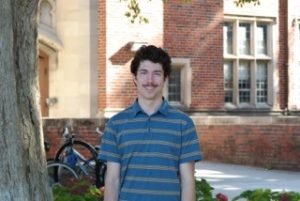
When and where was your undergraduate research experience?
I began my undergraduate research experience in the summer of 2017, and primarily worked at UT campus labs, but also the Joint Institute for Advanced Materials and Argonne National Laboratory in Chicago.
Tell us about your research.
My research involved examining manufacturing parameters associated with 3-D printing, and observing how that effects defect characteristics in samples.
How did you go about finding this research opportunity?
I was able to find my research opportunity by first of all getting to know the faculty teaching my courses. I was fortunate Dr. Claudia Rawn helped get me in contact with some professors. After that I was able to find a good fit with Dr. Hahn Choo, and do some really exciting research.
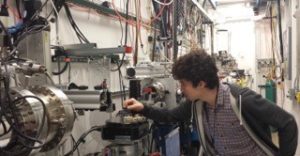
How did the experience benefit you?
This experience benefited me in multiple ways. Academically I immersed myself in the world of Materials Science for a whole summer which was a huge help for my sophomore coursework. Professionally my research assistantship allowed me to develop professional skills necessary in the workplace, and also gave me valuable experience to expand upon in future internships.
Do you have any advice for other students considering undergraduate research?
My advice would be it’s never too early. I think a lot of people don’t do a whole lot the summer after their first year because it seems daunting to have an internship or research job, but if you take the initiative and get a position there is a support framework to help you succeed in that professional environment.
What else are you involved in?
I am the vice president of The Canoe and Hiking Club, so I get to spend a lot of time outside hiking, biking, and kayaking. I also play a lot of intramurals which are an important outlet for me during a stressful semester.
